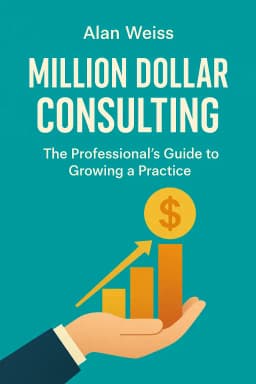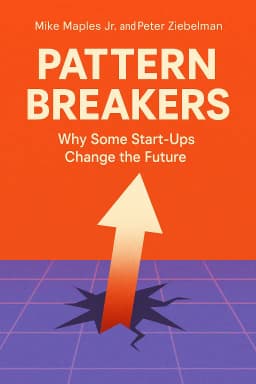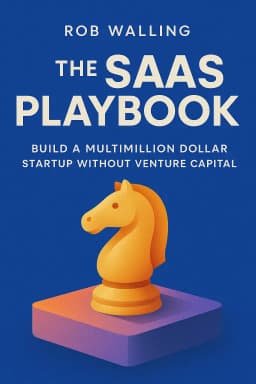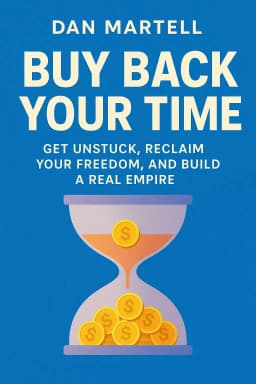
The Unfair Truth of Success
How You Already Have What It Takes to Succeed
Golden Hook & Introduction
SECTION
Mark: Alright, Michelle, pop quiz. What's the most common advice for success? 'Work hard, never give up,' right? Michelle: Oh, absolutely. It’s practically tattooed on the inside of every business book. The gospel of grit. Mark: Well, what if I told you that's not just incomplete, it's dangerously misleading? The secret to success might actually be in the advantages you think you don't have. Michelle: Okay, you've got my attention. That sounds like a direct attack on the entire self-help industry. Where is this coming from? Mark: It's from a book that's been making serious waves, called 'The Unfair Advantage' by Ash Ali and Hasan Kubba. It actually won the UK's Business Book of the Year award, and what's fascinating is that the authors aren't academics from some ivory tower. They're scrappy, hands-on entrepreneurs who built businesses from the ground up, sometimes with very little money. They wrote this to counter all the theoretical advice they felt didn't apply in the real world. Michelle: I like that already. A dose of reality from people who've actually been in the trenches. So, if it's not just about hard work, what is it about? Mark: It’s about the fact that life isn't fair. And instead of pretending it is, we should get smart about using that unfairness to our advantage.
The Myth of Meritocracy & The 'Reality-Growth Mindset'
SECTION
Mark: They kick things off by tackling a giant myth, and they use the perfect story to do it: Evan Spiegel, the founder of Snapchat. Michelle: Right, the guy who became a billionaire before he was 25. I’m guessing he wasn't just working harder than everyone else. Mark: Not even close. The book lays it out. Spiegel grew up in a multimillion-dollar household in LA. His parents were powerful lawyers. When he had the idea for Snapchat at Stanford, he didn't just have a good idea; he had a network. His family connections got him meetings with tech titans—the former CEO of Google, the founder of Intuit. In fact, the founder of Intuit, Scott Cook, personally mentored him and invested in Snapchat's very first funding round. Michelle: Wow. So his starting line was basically most people's finish line. Mark: Exactly. And the most incredible part is Spiegel’s own self-awareness. He’s quoted saying, "I am a young, white, educated male… I got really, really lucky. And life isn’t fair." He knew his advantages were immense. Michelle: Hold on. So is the book's first lesson 'be born rich'? That feels a bit defeating for the 99.9% of us who weren't. How is that helpful? Mark: That’s the perfect question, and it’s the core of the book's first big idea. It’s not about envying privilege; it's about acknowledging that these factors—money, connections, luck—are real and powerful. The authors call this the "Reality-Growth Mindset." Michelle: Reality-Growth Mindset. Okay, break that down for me. Mark: It's a blend of two things. The 'reality' part is accepting that some things are out of your control. Matter matters. Your starting point, your genetics, your location—they all have an impact. You can't just wish your way into being a seven-foot-tall basketball player. Michelle: Right, that’s the ‘life isn’t fair’ part. Mark: But the 'growth' part is the belief that you can still dramatically improve your situation. Mind over matter. You can learn, you can adapt, you can build skills. The book’s mantra is essentially "mind over matter, but matter still matters." It’s about being realistic without being fatalistic. Michelle: I can see how that’s a healthier way to look at it. It stops you from the two extremes: either blaming yourself for everything, or blaming the world for everything. Mark: Precisely. And they use another powerful story to show the other side of the coin: Oprah Winfrey. Her childhood was the polar opposite of Spiegel's—born into deep poverty in rural Mississippi, facing horrific abuse. On paper, she had every disadvantage. Michelle: Absolutely. A textbook case of starting from behind. Mark: But she had innate talents—her 'unfair advantages.' She had a phenomenal gift for public speaking from a young age. Her grandmother taught her to read the Bible at age three, and she was nicknamed 'The Preacher' because she could recite verses with such power. That was her raw talent. And through a combination of that talent and immense grit, she honed that skill, won a public speaking scholarship to university, and built an empire. Her difficult past gave her an incredible insight into human struggle, which became the foundation of her connection with her audience. Michelle: So her advantage wasn't money or status, but this unique combination of innate talent and insight born from hardship. Mark: Exactly. The book argues that we all have a unique stack of advantages, but we're often blind to them because they don't look like the ones we see celebrated in magazines.
The MILES Framework: Your Personal Audit for Success
SECTION
Michelle: Okay, I get the mindset part. Acknowledge reality, but don't be a victim. But how do you actually figure out what your advantages are if you're not Evan Spiegel or Oprah? This is where it gets practical, right? Mark: This is where it gets brilliant. The authors introduce a framework they call MILES. It’s an acronym to help you audit your own set of unfair advantages. Michelle: MILES? Sounds like a travel program. Break that down for me. Mark: I promise it’s more useful! MILES stands for: Money, Intelligence and Insight, Location and Luck, Education and Expertise, and Status. Michelle: Okay, that’s a really clear way to categorize things. Money and Education are pretty obvious. But what’s the difference between Intelligence and Insight? Mark: Great question. The book makes a fantastic distinction. Intelligence can be 'book smarts'—the ability to absorb and process complex information. But Insight is different. It’s a unique perspective, a deeper understanding of a problem that others might miss. It often comes from personal experience. Michelle: I love that 'Insight' is separate from 'Intelligence.' You don't have to be a genius to have a brilliant observation. Can you give me a real-world example of how 'status'—or even a lack of it—can be an advantage? It sounds a bit abstract. Mark: Perfect segue to one of the best stories in the book: Sara Blakely, the founder of Spanx. She came from a middle-class background, failed her law school exams twice, and ended up selling fax machines door-to-door. In terms of traditional status, she had very little. Michelle: Right, she wasn't exactly a Silicon Valley insider. Mark: But her lack of 'insider' status was her greatest advantage. As a woman, she had an insight that the male-dominated hosiery industry had completely missed for decades. She was getting ready for a party and wanted a smooth look under white pants, so she cut the feet off her pantyhose. In that moment, she saw a massive, unserved need. That was her unique insight. Michelle: An insight no male executive would ever have. Mark: Exactly. And she had to build her status from scratch. She bootstrapped Spanx with $5,000 of her own savings. She learned about patents from a textbook. And then, in a stroke of genius, she sent a gift basket to Oprah Winfrey. Oprah loved the product, named it one of her 'Favorite Things,' and the rest is history. Blakely became the world's youngest self-made female billionaire. Her unfair advantage wasn't inherited status; it was an outsider's insight combined with incredible grit. Michelle: That’s so powerful. It completely reframes what an 'advantage' can be. It’s not just what you're given, but what you see. Mark: And you can contrast that with another story, the Collison brothers, who founded the payments company Stripe. Their MILES profile was almost the opposite of Blakely's. Michelle: How so? Mark: They were Irish programming prodigies. Their unfair advantages were off the charts in Intelligence and Education. Patrick, the older brother, created his own programming language at 16. Both got into elite US universities, MIT and Harvard. Their parents were entrepreneurs, so they also had Status within a family culture that normalized risk-taking. They leveraged that raw intellectual horsepower and educational pedigree to build Stripe into a multi-billion dollar company. Michelle: So, two completely different paths to enormous success, fueled by totally different parts of the MILES framework. Blakely with Insight, the Collisons with Intelligence and Education. Mark: Precisely. And that’s the book's point. There’s no single formula. The key is to stop trying to copy someone else's MILES profile and start auditing your own.
Building Your Venture: The Human Side of Unfair Advantages
SECTION
Mark: And this framework isn't just for navel-gazing. The authors argue it's the most powerful tool for the most critical startup decision: who you build with. Michelle: Ah, the people part. Because you can have all the advantages in the world, but if you're going it alone, it's a tough road. Mark: It's an almost impossible road. The book shares the story of Anthony Casalena, the founder of Squarespace. He ran the company completely by himself for the first three years. Michelle: Wow, a solo founder of a major tech company. That’s rare. Mark: And for good reason. He became so consumed with stress that he refused to get on a plane because he was terrified of being disconnected from the servers. He started having panic attacks. It was an isolating, brutal experience. The emotional toll is immense. Michelle: I can only imagine. It highlights why a team is so crucial. So how does the MILES framework help you build one? Mark: The book suggests that a founding team ideally needs three core roles: a Creator, a Communicator, and a Technician. The Creator is the visionary with the big ideas. The Communicator is the salesperson, the marketer, the storyteller. And the Technician is the one who can actually build the thing. Michelle: That makes perfect sense. And I’m guessing the most successful teams have co-founders with complementary MILES profiles that fit these roles. Mark: You nailed it. Think of the most iconic duo in tech: Steve Jobs and Steve Wozniak at Apple. Jobs was the ultimate Creator and Communicator—the visionary, the marketer, the master of status. Wozniak was the pure Technician—the engineering genius who could turn Jobs's vision into a physical product. Their individual unfair advantages were powerful, but when stacked together, they were unstoppable. Wozniak had the Education and Expertise; Jobs had the Insight and Status. Michelle: A perfect blend. Okay, so you need a team with complementary MILES profiles. But how do you find these people? It's not like they wear their 'Unfair Advantages' on a t-shirt. Mark: The book's advice here is simple but profound: you network. But not in that slimy, transactional way of just collecting business cards. You build genuine relationships by seeking to add value to others first. Michelle: So, instead of asking a potential mentor, 'What can you do for me?', you should be asking, 'What can I do for you?' Mark: Exactly. Offer your skills, make a useful introduction, share a relevant article. And when you do get a meeting with someone of high status, the advice is to act naturally. Don't be a sycophant. They're just people. Apply their advice quickly and report back on the results. That shows you respect their time and makes them want to invest more in you. It’s how you turn a simple contact into a mentor, an advisor, or even a co-founder.
Synthesis & Takeaways
SECTION
Michelle: It feels like the book's ultimate message is a form of radical self-acceptance. Stop comparing your starting line to someone else's, and instead, get really honest about what's in your own toolkit. Mark: That's a perfect way to put it. It’s about auditing your reality—your MILES profile—and then applying a growth mindset to it. Your weaknesses aren't necessarily permanent liabilities. A lack of money, like for the authors, can force you to be more creative. A lack of status, like for Sara Blakely, can give you an outsider's insight that no one else has. Michelle: It’s empowering because it implies everyone has something. You might not have Money, but you might have a unique Insight. You might not have a fancy Education, but you might have incredible grit and street smarts. Mark: Exactly. The book’s final message is that you already have what it takes to succeed. You just need to have the self-awareness to see it and the courage to use it. Michelle: And it’s a continuous process, right? Your advantages can change over time. Mark: Absolutely. The MILES audit isn't a one-and-done thing. It's a living document. You can actively work to build your expertise, expand your network to increase your status, or move to a new location to get lucky. Michelle: So the most powerful thing someone can do after listening is to actually do that audit. Mark: I think so. And the most powerful thing you can do after listening is to just take five minutes and jot down your own MILES audit. What's one advantage in each category you've never considered? We'd love to hear what you discover. Share your biggest 'aha' moment with the Aibrary community on our socials. Michelle: I love that. It’s a challenge to our listeners to find their own unfair advantage. Mark: This is Aibrary, signing off.









